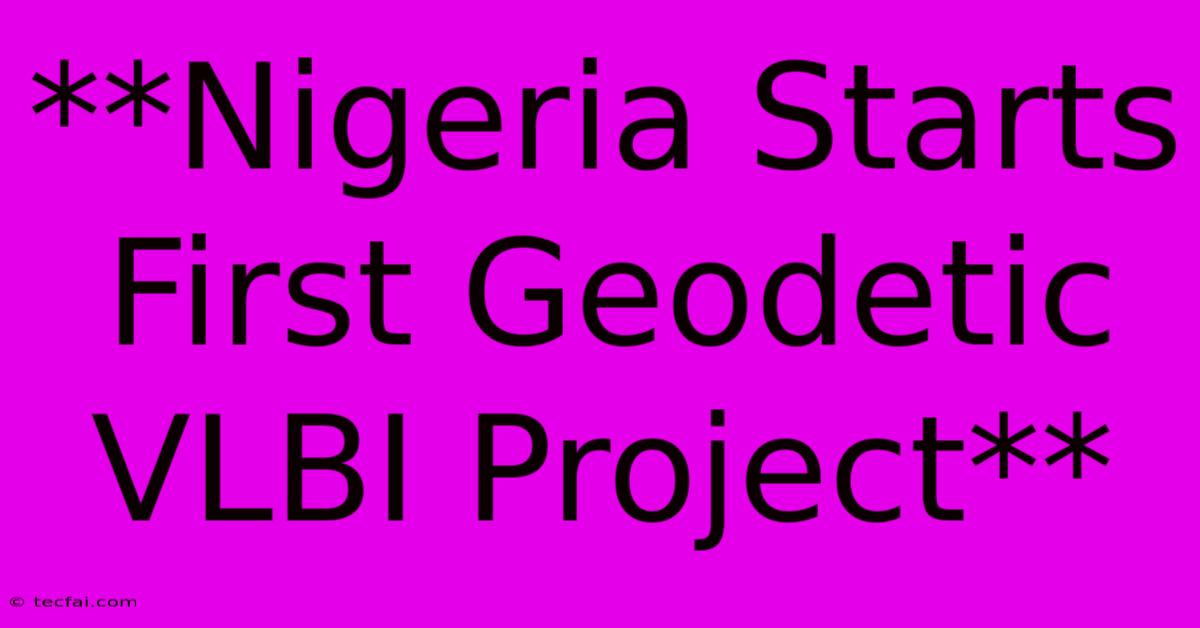**Nigeria Starts First Geodetic VLBI Project**

Discover more detailed and exciting information on our website. Click the link below to start your adventure: Visit Best Website tecfai.com. Don't miss out!
Table of Contents
Nigeria Starts First Geodetic VLBI Project: A Leap Forward for Geospatial Technology
Nigeria has embarked on a significant advancement in its geospatial capabilities with the commencement of its first Geodetic Very Long Baseline Interferometry (VLBI) project. This initiative marks a pivotal moment for the nation's surveying, mapping, and overall infrastructure development. VLBI technology offers unparalleled accuracy in determining the Earth's orientation and precise positioning, opening doors to numerous applications across various sectors.
Understanding Geodetic VLBI and its Significance
Geodetic VLBI is a sophisticated technique that uses radio telescopes situated thousands of kilometers apart to observe quasars – extremely distant and stable celestial radio sources. By precisely measuring the time delay in the arrival of radio waves from these quasars at different telescopes, scientists can determine the baseline distance between the telescopes with incredible accuracy, down to millimeters. This precise measurement forms the foundation for a highly accurate geodetic reference frame, crucial for numerous applications.
Why is this project important for Nigeria?
This project represents a monumental step forward for several reasons:
- Improved Infrastructure Development: Precise positioning data from VLBI is crucial for the planning and construction of large-scale infrastructure projects like roads, railways, dams, and pipelines. The accuracy offered by VLBI minimizes errors and ensures cost-effectiveness.
- Enhanced Natural Resource Management: Accurate geospatial data improves the management of natural resources, aiding in land surveying, environmental monitoring, and the sustainable exploitation of resources like oil and gas.
- Strengthened Disaster Management: VLBI contributes to improved disaster preparedness and response by providing precise measurements for monitoring tectonic plate movements and assessing earthquake and volcanic risks.
- Boost to Scientific Research: The project will stimulate scientific research and collaboration in geodesy, astronomy, and related fields, fostering the development of local expertise and technological capabilities.
- Global Collaboration and Data Sharing: Participation in the global VLBI network allows Nigeria to contribute to and benefit from international geodetic data, enhancing its position within the global scientific community.
The Project's Potential Impact
The long-term implications of this project are far-reaching. It will undoubtedly lead to:
- Improved accuracy in mapping and surveying: This translates to better land administration, reduced land disputes, and more efficient resource allocation.
- Development of a robust geospatial infrastructure: This will attract investment, support economic growth, and improve the quality of life for Nigerians.
- Enhanced national security: Accurate geospatial information plays a vital role in national security, including border management and defense.
Challenges and Opportunities
While this project presents immense opportunities, it also faces challenges. These include:
- Funding and Resource Allocation: Securing sustained funding and allocating sufficient resources for equipment, personnel training, and data processing are crucial for the project's success.
- Developing Local Expertise: Investing in the training and development of local scientists and engineers is vital to ensure long-term sustainability.
- Data Management and Infrastructure: Establishing a robust infrastructure for data storage, processing, and dissemination is essential to maximize the benefits of the project.
However, the potential rewards far outweigh the challenges. By embracing this cutting-edge technology, Nigeria is positioning itself at the forefront of geospatial innovation in Africa and globally. This initiative demonstrates a commitment to technological advancement and sustainable development, paving the way for a more accurate, efficient, and prosperous future. The successful completion of this project will serve as a model for other African nations seeking to enhance their geodetic capabilities. The Nigerian government's investment in this technology signals a promising future for the country's scientific and technological development.

Thank you for visiting our website wich cover about **Nigeria Starts First Geodetic VLBI Project**. We hope the information provided has been useful to you. Feel free to contact us if you have any questions or need further assistance. See you next time and dont miss to bookmark.
Featured Posts
-
Ct Social Security Bill Clears House Raises Benefits
Nov 15, 2024
-
Rugby England Names Squad To Face Springboks
Nov 15, 2024
-
New Zealand Parliament Faces Maori Protest
Nov 15, 2024
-
Sydney Sweeneys Carol Baum Reaction
Nov 15, 2024
-
Davina Mc Call Brain Tumor Surgery Update
Nov 15, 2024
